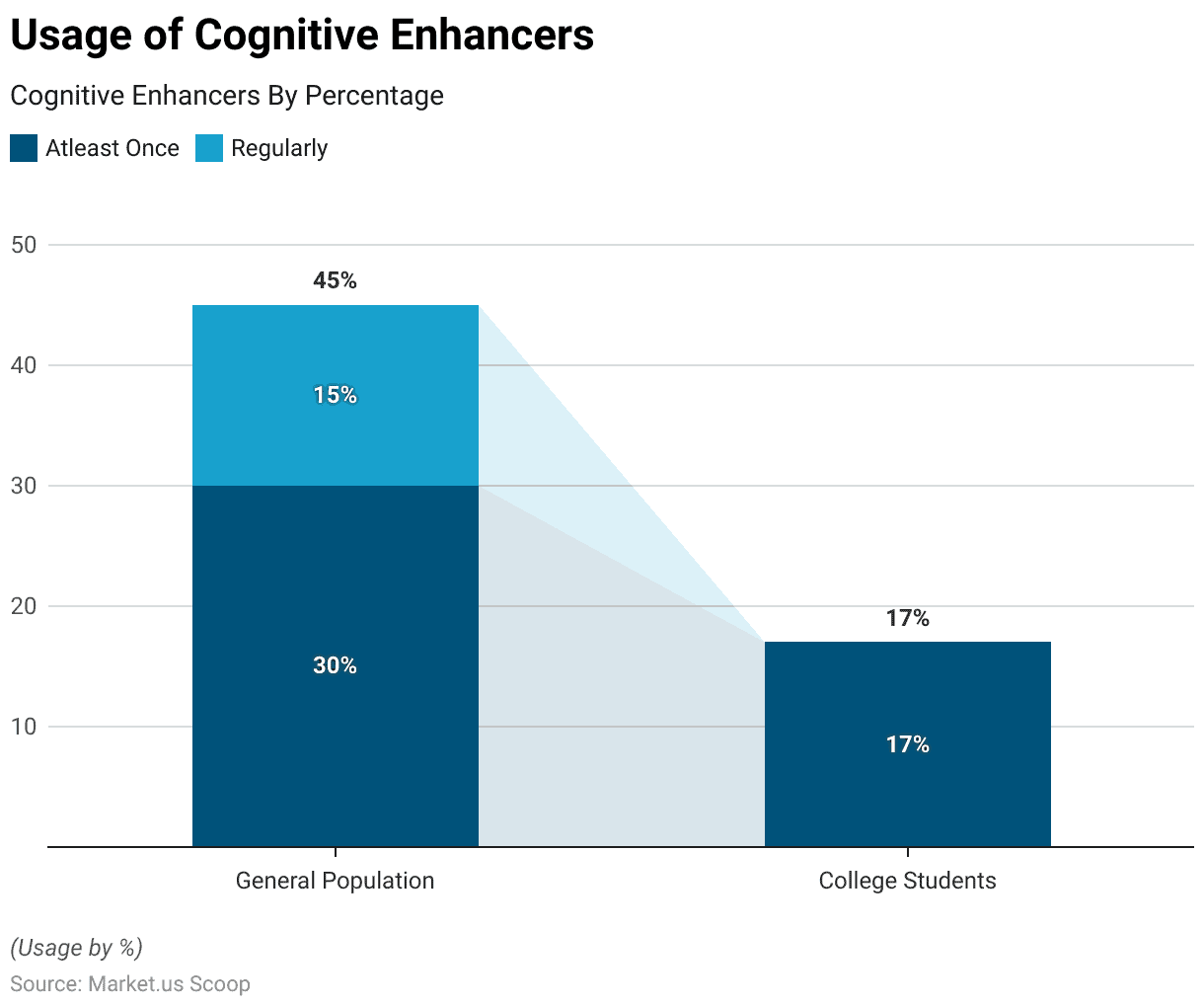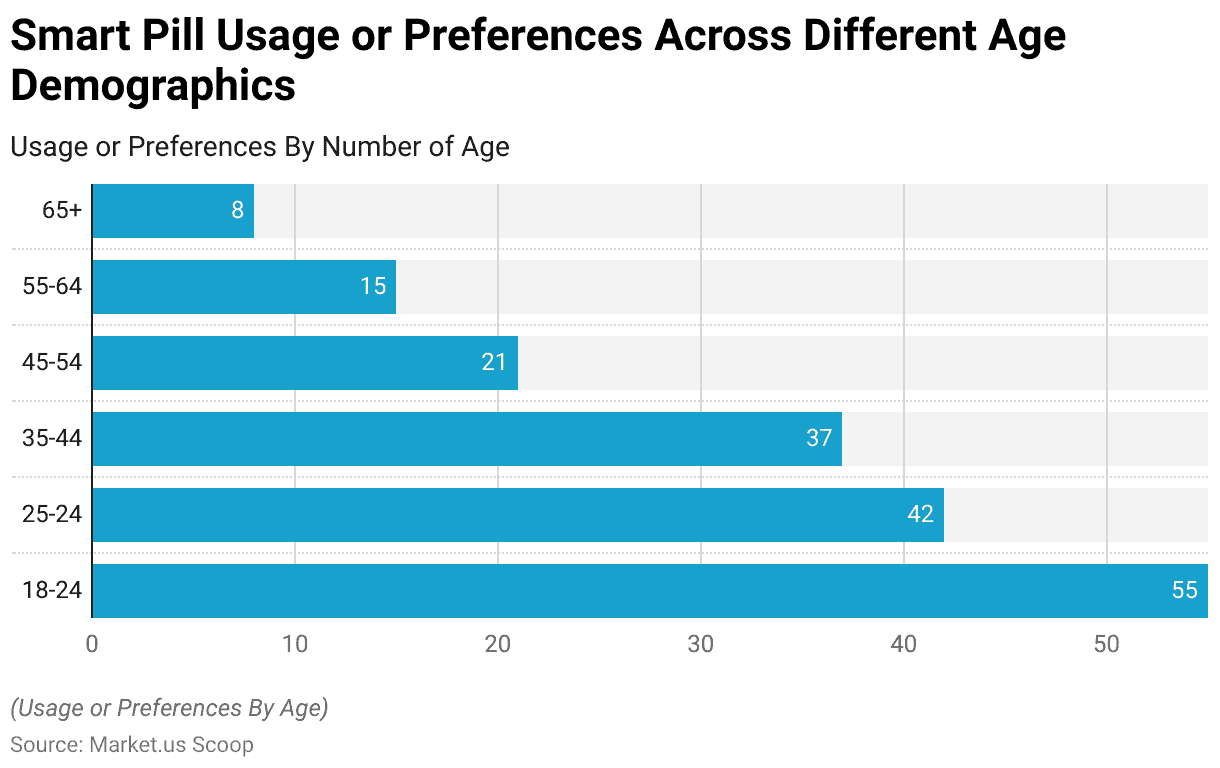Table of Contents
According to Smart Pills Statistics, Smart pills are a class of digital health tools, typically composed of ingestible sensors, cameras, and trackers. They are designed to navigate through the human digestive tract, providing real-time, detailed information on the gastrointestinal tract’s health and other physiological parameters.
Editor’s Choice
- The global smart pill market is projected to reach $4.75 billion by the end of 2023, growing at a CAGR of 16.6% from 2018 to 2023
- Approximately 500,000 capsule endoscopies will be conducted annually worldwide by 2022.
- Around 50% of patients do not take their medications as prescribed, a challenge that smart pills could address.
- A survey conducted in 2022 showed that 67% of healthcare professionals agreed that smart pills could improve patient outcomes, and about 45% had already started using pills in their practice.
- Around 78% of surveyed patients reported they would feel comfortable ingesting a smart pill if prescribed.
- An AI algorithm could predict the development of inflammatory bowel disease in 86% of cases by analyzing data from smart pills.
- The United States is dominant in the global smart pills market with the largest market share.
- Smart Healthcare Market was valued at USD 184 billion and is expected to reach around 541 billion in 2032
Types of Smart Pills and Their Benefits
There are primarily two types of smart pills: diagnostic and therapeutic.
Cognitive Enhancing Pills (Nootropics)
- A study conducted in the US and Germany indicated that around 30% of respondents used cognitive enhancers at least once, while about 15% used them regularly.
- The typical users of these substances tend to be male, usually aged between 25 and 45.
- 17-20% of college students may use prescription drugs as cognitive enhancers.
- A 2018 review in the journal “European Neuropsychopharmacology” noted that among college students in the US, self-reported use of prescription stimulants (which can have nootropic effects) was estimated at 17%.
- A study in Germany estimated the lifetime prevalence of the use of prescription drugs for cognitive enhancement at about 20%.

Diagnostic and Therapeutic Smart Pills
- Diagnostic smart pills include capsule endoscopy and patient health monitoring systems. Capsule endoscopy smart pills, equipped with tiny cameras, capture images of the gastrointestinal tract for non-invasive diagnosis. By 2022, about 500,000 capsule endoscopies will be conducted annually worldwide.
- Therapeutic smart pills deliver targeted medication to specific locations within the body, improving drug effectiveness and reducing side effects. They can enhance adherence to treatment, which is a substantial challenge, considering around 50% of patients do not take their medications as prescribed
Adoption and General Statistics
- A survey published in Drug Delivery Letters in 2022 indicated that around 78% of patients surveyed would feel comfortable ingesting a smart pill if prescribed by their healthcare provider.
- A separate study focused on the elderly, a demographic particularly prone to chronic diseases, found that 73% of participants were open to using pills for health monitoring and medication management.
- A study published in the Journal of Medical Internet Research found that smart pills improved medication adherence by up to 15%.
- About 78% of patients said they would feel comfortable ingesting a smart pill if prescribed, suggesting high patient acceptance.
- By 2022, approximately 500,000 capsule endoscopies were conducted annually worldwide, reflecting the growing use of diagnostic pills.
- A study by the University of California showed that an AI algorithm could predict inflammatory bowel disease development in 86% of cases using data from smart pills.
Smart Pill Usage or Preferences Across Different Age Demographics

Advancements in Smart Pills Technology
- Miniaturization: Recent advances in smart pill technology have focused on miniaturizing pills to make them smaller and simpler for patients to swallow, providing increased patient comfort and compliance.
- Sensors and Tracking: Smart pills now feature sensors designed to measure various physiological parameters inside of our bodies, including pH levels, temperature fluctuations, drug release patterns, and patient response patterns. These sensors offer valuable insight into drug efficacy and patient response.
- Wireless Communication: Recently, advances have been made that enable pills to wirelessly transmit data to external devices and help healthcare providers monitor patient adherence, drug effectiveness, and other pertinent data in a real-time. Drug Delivery Systems: Researchers are exploring smart pills with advanced drug delivery systems that release medications precisely at specific points within the digestive tract or even target specific cells or tissues – increasing drug efficacy while simultaneously decreasing side effects.
- Integration with Wearable Devices: Smart pill technology can be combined with wearable devices such as smartwatches or patches for enhanced data collection and analysis, providing a deeper insight into patient health and medication response.
- Artificial Intelligence (AI) Integration: Artificial intelligence is being explored as part of smart pill technology to analyze collected data and offer personalized insights and recommendations. AI algorithms can detect patterns, spot trends, and help healthcare providers make informed decisions.
Challenges in Smart Pills Technology
- Privacy and Data Security: Smart pills collect sensitive health data, so ensuring their privacy and security are of utmost importance. Preventing unauthorized access while also upholding data integrity is a major challenge facing medical providers today.
- Approval Process: Pills must comply with strict regulatory oversight, and receiving approval from regulatory authorities may be a long and tedious process. Meeting safety, efficacy and quality standards set by regulators is paramount, yet meeting them may present many difficulties.
- Patient Acceptance and Adoption: For pills to succeed, patient acceptance and adoption are crucial. Addressing potential concerns regarding the ingestion of electronic devices, privacy considerations, and possible side effects may prove challenging.
- Technical Reliability: Smart pills rely on various technologies, including sensors, wireless communication, and data processing. Ensuring their reliability and accuracy as well as mitigating technical issues or failures remains an ongoing challenge.
- Cost: The costs associated with developing and manufacturing smart pills can be significant, making them unaffordable and inaccessible to patients and healthcare systems alike. Finding cost-cutting production methods and affordable solutions is therefore paramount in meeting this challenge head-on.
- Integrating Smart Pill Technology into Healthcare Systems: Integrating smart pill technology into existing healthcare systems and workflows is not without difficulty, requiring careful planning and coordination between all parties involved to ensure smooth data exchange, interoperability with electronic health records (EHRs), and integration into healthcare professionals’ workflow.
Discuss your needs with our analyst
Please share your requirements with more details so our analyst can check if they can solve your problem(s)



